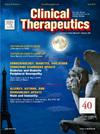The Effect of Rituximab on the Cognitive Function of Patients with Relapsing-Remitting Multiple Sclerosis
IF 3.2
4区 医学
Q2 PHARMACOLOGY & PHARMACY
引用次数: 0
Abstract
Purpose
Cognitive impairment can begin in the early stages of multiple sclerosis (MS). No medicine has been approved for treating cognitive impairment in MS patients. There is a lack of data on the role of rituximab in managing cognitive impairment in MS patients. Using minimal assessment of cognitive function in MS (MACFIMS), this study aims to investigate the effect of rituximab on the cognitive status of relapsing-remitting MS (RRMS) patients.
Methods
In this pre-post interventional trial, 28 eligible RRMS patients participated. They were administered rituximab for a year. Cognitive tests (MACFIMS), MS neuropsychological questionnaire (MSNQ), and Beck depression inventory-fast screen (BDI-FS) scores were evaluated at baseline, six, and 12 months following rituximab administration.
Findings
Eighteen participants with a mean age of 40.5 ± 12.91, 7 men, completed all three follow-ups. There was no statistically significant change in BDI-FS, MSNQ, Paced Auditory Serial Addition Test (P: 0.743), Symbol Digit Modalities Test (P: 0.711), Brief Visual Memory Test (BVMT) (P: 0.426), learning BVMT (P: 0.268), and delayed recall BVMT (P: 0.394) scores. However, the California Verbal Learning Test (CVLT), CVLT learning, and Controlled Oral Word Association Test scores significantly improved by 45.2% (P < 0.001), 12.3% (P: 0.013), and 26.7% (P: 0.011), respectively, 6-month follow-up rituximab treatment. There was a significant improvement in CVLT (+55.7%, P < 0.001), CVLT learning (+15.9%, P: 0.011), and delayed recall CVLT (+28%, P: 0.022) scores 12-month follow-up rituximab treatment.
Implications
Rituximab prevents cognitive deterioration and improves some cognitive functions. Further investigations with a larger sample size, longer follow-ups, and inclusion of a placebo or another treatment arm are recommended.
利妥昔单抗对复发性多发性硬化症患者认知功能的影响
目的:多发性硬化症(MS)早期即可出现认知障碍。目前还没有获准用于治疗多发性硬化症患者认知功能障碍的药物。关于利妥昔单抗在控制多发性硬化症患者认知功能障碍方面的作用,目前还缺乏相关数据。本研究采用多发性硬化症认知功能最低评估(MACFIMS),旨在调查利妥昔单抗对复发缓解型多发性硬化症(RRMS)患者认知状况的影响:在这项前-后干预试验中,有28名符合条件的RRMS患者参与。他们接受了为期一年的利妥昔单抗治疗。在使用利妥昔单抗后的基线、6个月和12个月评估认知测试(MACFIMS)、多发性硬化症神经心理学问卷(MSNQ)和贝克抑郁清单-快速筛查(BDI-FS)得分:18名参与者完成了所有三次随访,平均年龄(40.5±12.91)岁,其中7人为男性。BDI-FS、MSNQ、步调听觉连续加法测验(P:0.743)、符号数字模型测验(P:0.711)、简短视觉记忆测验(BVMT)(P:0.426)、学习BVMT(P:0.268)和延迟回忆BVMT(P:0.394)的得分均无统计学意义上的变化。然而,利妥昔单抗治疗 6 个月后,加利福尼亚言语学习测试(CVLT)、CVLT 学习和控制性口语单词联想测试的得分分别显著提高了 45.2% (P < 0.001)、12.3% (P: 0.013) 和 26.7% (P: 0.011)。利妥昔单抗治疗12个月后,CVLT(+55.7%,P<0.001)、CVLT学习(+15.9%,P:0.011)和延迟回忆CVLT(+28%,P:0.022)得分均有明显改善:意义:利妥昔单抗可预防认知功能退化并改善某些认知功能。建议进行样本量更大、随访时间更长的进一步研究,并纳入安慰剂或其他治疗组。
本文章由计算机程序翻译,如有差异,请以英文原文为准。
求助全文
约1分钟内获得全文
求助全文
来源期刊

Clinical therapeutics
医学-药学
CiteScore
6.00
自引率
3.10%
发文量
154
审稿时长
9 weeks
期刊介绍:
Clinical Therapeutics provides peer-reviewed, rapid publication of recent developments in drug and other therapies as well as in diagnostics, pharmacoeconomics, health policy, treatment outcomes, and innovations in drug and biologics research. In addition Clinical Therapeutics features updates on specific topics collated by expert Topic Editors. Clinical Therapeutics is read by a large international audience of scientists and clinicians in a variety of research, academic, and clinical practice settings. Articles are indexed by all major biomedical abstracting databases.
 求助内容:
求助内容: 应助结果提醒方式:
应助结果提醒方式:


